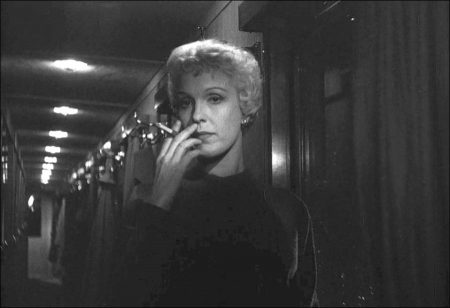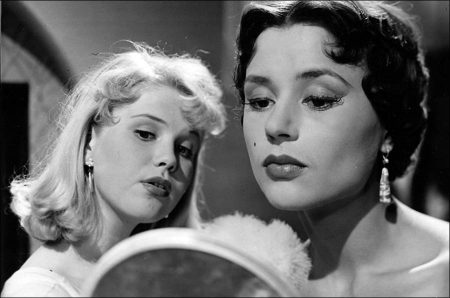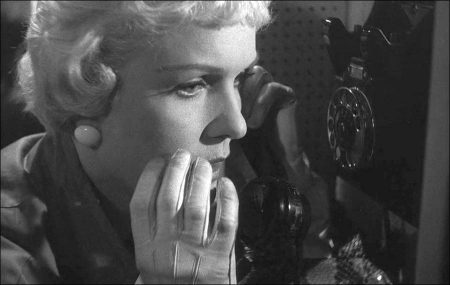Dreams movie storyline. In Stockholm, the fashion photographer Susanne Frank misses her married lover Henrik Lobelius that lives in Gothenburg with his wife and children, and the naive twenty years old model Doris has a troubled relationship with her boy friend Palle Palt. Susanne schedules a session of photo shoots in Gothenburg with Doris, and once there, she calls Henrik for an encounter.
Meanwhile, Doris meets an elegant middle age gentleman on the street, the Consul Otto Sönderby, who buys expensive gifts for her: a dress, a pair of Italian gloves and valuable pearl necklace. They spend the afternoon together in an amusement park and later they go to Otto’s mansion, where they are interrupted by his wicked daughter Marianne. Susanne has a love affair with Henrik in her room, but they are interrupted by his cynical wife. The incidents in these encounters affect their perspective of love.
Dreams (Swedish: Kvinnodröm) is a 1955 Swedish drama film directed by Ingmar Bergman and starring Eva Dahlbeck, Harriet Andersson, Gunnar Björnstrand, Ulf Palme, Inga Landgré, Benkt-Åke Benktsson, Sven Lindberg, Kerstin Hedeby, Siv Ericks, Gösta Prüzelius and Sigvard Törnqvist. The film was theatrically released on August 22, 1955.

Film Review for Dreams
Let us start by making an important distinction: the title of Ingmar Bergman’s first feature from 1955 might be generally given in English as Dreams, but the Swedish title Kvinnodröm more literally translates to “Women’s dreams”. And this is, after a fashion, what the film presents: a pair of women hoping for more than they’re getting out of life, particularly their love lives. I specify this because part of the trouble the film will eventually get itself into is waffling on the “women” part of that construction, and also because the women’s dreams that Bergman has presented for us are perhaps not so fascinating and rich as to justify that kind of grandly all-encompassing title. But then, Bergman kind of didn’t want to make the film, and you can kind of tell.
The film exists for one primary reason: Bergman knew that Sandrew-Produktion had taken a bullet for him in producing the unmarketable flop Sawdust and Tinsel in 1953, and to pay that company back, he made a much more conventionally likable melodrama (it would be the last time Bergman left his home base of Svensk Filmindustri until his self-imposed exile from Sweden in the 1970s).
A reliable source for Swedish box-office data is one of the things I just don’t have, as hard as I might wish otherwise, but my sense is that this didn’t really play out the way Sandrews wanted it to. At any rate, Dreams has never been regarded as top-tier Bergman, even by the standards of his earlier work (and we are, at this point, right at the tail end of anything we can reasonably call “early Bergman”), and seems to be a cast-off obscurity even in his own recollections of his career.
I’m not here to tell you that this is a regrettable fact. Dreams is more good than bad; in fact, I don’t know that much of anything about it is “bad” at all. But more than anything, it’s insubstantial. Starting with his previous feature and first full-on comedy, A Lesson in Love, Bergman was deliberately trying to be lighter and less obsessed with the depths of human misery and suffering than the films that had made his name and reputation, and Dreams is very much a part of that.
It would be quite an exaggeration, I think, to call it a “comedy”, though it does recall the words spoken right at the start of Lesson, that all that really makes a comedy is that people come to good ends. Whether or not that’s what happens in Dreams is a question the film leaves for the viewer, though it’s certainly optimistic and generous in a way that e.g. the heavy gut-punch that Summer with Monika lands in its final shot isn’t. The film is rarely funny as such, but it often has a wry wistfulness that is mirthful, sometimes not even with bitter undercurrents.
The issue is that Bergman doesn’t quite seem to believe in his own light touch. The most ingenious, memorable, and formally engaged part of the whole film is a wordless montage during which Susanne (Eva Dahlbeck), one of the main characters, is frantically grappling with her impulse to commit suicide by throwing herself off a train; hardly a moment that belongs in a light drama at all, arguably, and that it is so tangibly the scene that excited Bergman the most to shoot doesn’t do anything to counteract that impression.
Really, the first part of the film is where almost all of the very best stuff is found, including an opening that lets us see inside Susanne’s frustration and restlessness entirely through how she looks at things, crisply cutting back and forth between Dahlbeck’s tight, sour face and the photo shoot she’s overseeing. She’s the owner of a Stockholm modeling agency, you see, and things aren’t going well with her star model Doris (Harriet Andersson): Doris has, in fact, just had a huge fight with her fiancé Palle (Sven Lindberg), and it’s putting Susanne in a foul mood about her own romantic issues, as well as getting in the way of the shoot. Thus the two women depart by train to Göteborg, for creative rejuvenation, to take some photographs, and, unofficially, so Susanne can meet up with a married ex-lover.
Dreams is pretty great prior to the arrival in Göteborg; the contrast between Susanne’s coiled-up, unstated inner tension, revealed in close-ups, and the cluttered wide shots of the shoot is very effective, if perhaps obvious, visual storytelling. The presence of a leering, Jabba the Hutt-like man named Magnus (Benkt-Åke Benktsson), a manager of some sort whose body language oozes grossly sexual fascination with the models, presents a very nice intrusion of just the kind of male vulgarity that will hang over much of the rest of the film.
Better yet, the material on the train is extremely well done, and not just because of the excellent suicide scene. Upon arriving in the city, the film drops considerably in interest, unfortunately, and it doesn’t take very long for us to arrive there. In Göteborg, where the weather prevents any photography from taking place, the women spend their days apart, and the film presents them as two separate blocks of storytelling. We follow Doris first, in the longer sequence by far, as she meets a wealthy older gentleman named Otto (Gunnar Björnstrand); he lavishes presents on her, insisting disingenuously throughout that it’s not because he has designs on seducing her, and she pretends to agree that’s not what’s going on.
They spend the day poking around town, having a nice time at the amusement park – he gets terribly sick on basically every ride – and then end up at his house, where the arrival of his adult daughter (Kerstin Hedeby) demolishes all the nice illusions the two have been playing at. Susanne’s day is much less adventuresome; she meets up with her ex, Henrik (Ulf Palme), a paunch, balding middle-aged man devoid of any obvious charms beyond harmless familiarity, and more importantly, she meets up with Henrik’s wife (Inga Landgré).
The two halves mimic each other, without being schematic; there are no horrible clichés about Doris being Susanne’s younger alter ego, or any such thing. Maybe more of a schema might have been helpful: the script is pretty slack, mostly around the Doris half of the plot. We have, till this point, almost entirely followed Susanne through the movie; finding that Doris is in fact the co-lead is a bit of a surprise, particularly since we no will not see Susanne for something like half of the 87-minute film’s overall runtime.
And then there’s the question: is this Doris’s story? Because by the time it’s over, we seem to have learned more about Otto and his own miserable middle-aged disillusionment and littleness of spirit. There’s no reason this can’t be a double-barrelled character study, of course, and much reason to say that it should be, but the branching structure of Dreams isn’t sturdy enough to handle everything that Bergman piles on it here.
Also, there’s the matter of giving Otto all this attention at Doris’s expense. The game of “let’s psychoanalyse the filmmaker” is always a bad one to play, but it’s oh so tempting in this case: Bergman’s romantic relationship with Andersson was ending (or had already ended), and putting her in the role of a beautiful young woman uncomfortably dealing with the increasingly desperate attempts by an older man to make her happy seems like it must have cut awfully close to the bone.
It’s hard not to wonder if Otto becomes so prominent because Bergman was too masochistically attached to the character’s pathetic suffering. At any rate, Doris falls to the background at the sequence’s climax, and while she rallies beautifully – the scene where she makes her muddled farewell to Otto features some of the most exemplary acting of Andersson’s career, confused and disappointed and embarrassed, all the conflicting emotions combining to overwhelm her forcibly gaiety from earlier in the day – one can’t shake the feeling that by the time the action has firmly pivoted to the daughter’s excoriation of the father’s sins, we have drifted awfully far from what Dreams presented as its core mission.
None of this is meant to diminish what Andersson and Björnstrand get out of this material. In fact, if there’s one thing Dreams is best at proving, it’s that Bergman had formed a natural enough rapport with his recurring actors that he could rely on them to carry his material by grounding it in character truths and complicated psychology even if the script lets them down. Those two, and Dahlbeck (playing a predominately serious role for the first time in a Bergman film), are giving Dreams a lot of depth and stability, making something concrete of their characters even if the script kind of thrashes about. And if it ends up shortchanging Susanne something awful.
Those performances are enough to make the film actively pleasant to watch. So does Hilding Bladh’s handsome cinematography: bedecked in a lush range of greys and whites, with the brightness of the photo shoot contrasting nicely with the dark contrast onboard the train to make a strong visual analogue for Susanne’s unsettled mood. It’s not especially complex, and the exteriors in Göteborg are mostly just there to capture the action, without even the documentary realism than can sometimes give location photography a little boot in interest.
But it is, at least, handsome. What’s missing, though, is any real drive, any insightful observations about humanity. Susanne’s film-ending gesture of kindness is remarkable, and immaculately-performed by Dahlbeck, and I’ll concede that knowing how the film ends might make me more attentive to how that ending is threaded throughout the rest of it when I watch it next. But as a guiding principle, I think the right thing to do is to keep it simple, and just accept that Bergman wasn’t feeling inspired when he made this. I certainly didn’t find anything especially inspiring about watching it.
Dreams (1955)
Directed by: Ingmar Bergman
Starring: Eva Dahlbeck, Harriet Andersson, Gunnar Björnstrand, Ulf Palme, Inga Landgré, Benkt-Åke Benktsson, Sven Lindberg, Kerstin Hedeby, Siv Ericks, Gösta Prüzelius, Sigvard Törnqvist
Screenplay by: Ingmar Bergman
Production Design by: Gittan Gustafsson
Cinematography by: Hilding Bladh
Film Editing by: Carl-Olov Skeppstedt
Makeup Department: Sture Höglund
MPAA Rating: None.
Distributed by: Sandrew-Baumanfilm AB
Release Date: August 22, 1955
Views: 299


